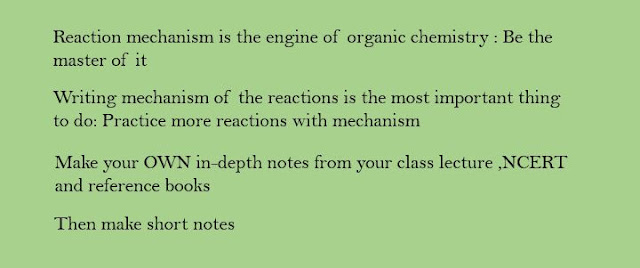How To Study Organic Chemistry For NEET
How to master the organic
chemistry is easy provided you follow disciplined path and focus more on
learning concepts rather than by hearting it. Studying organic chemistry
becomes fun when you start learning the basics first and then try to apply the
concepts later.
Most of the students who want to
apply the concept rather than to understand it first often struggle. You cannot
compromise on your basics in organic chemistry. You must be thorough in basic
concepts of organic chemistry first. So your journey actually starts from your
class 11 when you start learning those basic concepts. Your grade 12 organic
chemistry is the application of those concepts.
Organic chemistry is the most integrated network of concepts in
chemistry.
The main topics which you should focus on first can be summarized as
IUPAC nomenclature, Covalent bond
fission, reaction intermediates, electron displacement methods, Nucleophile and
electrophiles, types of organic reactions,
Alkanes - Conformations: Sawhorse
and Newman projections (of ethane); Mechanism of halogenation of alkanes.
Alkenes - Geometrical isomerism;
Mechanism of electrophilic addition: addition of hydrogen, halogens, water,
hydrogen halides (Markownikoff’s and peroxide effect); Ozonolysis, oxidation,
and polymerization.
Alkynes - Acidic character;
Addition of hydrogen, halogens, water and hydrogen halides; Polymerization.
Aromatic hydrocarbons -
Nomenclature, benzene - structure and aromaticity; Mechanism of electrophilic
substitution: halogenation, nitration, Friedel - Craft’s alkylation and
acylation, directive influence of functional group in mono-substituted benzene
Acids and Bases- relative strength
Consistently practice problems:
After you understand a concept you need to solve some questions. When you
attend a class, you need to make a notebook and write short notes. Always begin
with NCERT and solve as many questions as you can for that particular topic. Solve NEET previous year question papers.
This should be your routine-
after the class do some questions from the very topic and make short notes. Always
begin with simple and direct questions and then explore some difficult ones.
You should not try those questions
that you have not studied yet. Use one good reference in organic chemistry for
theory and practice as many problems as you can at the end of the chapter.
One of the main issue with
organic chemistry is remembering the reactions. See it is impossible to just memorize
a topic without understanding and understanding of the reaction comes from the
MECHANISM of the reaction. When you study a reaction try to write its mechanism
two to three times .That will reinforce your concept and remembering the
reaction becomes easy.
When you finish a chapter in
organic chemistry, write the reactions in detail in your note book but don’t forget to write a very brief note
of all those reactions at the end. A very brief note of all those reactions
at the end should help you in revision and it will give you a short overview of
the chapter also which ultimately helps in remembering the reactions.
One of the KEY STRATEGY is to write
the mistakes you make in a chapter and revise it regularly so as to remove those
mistakes.
Some Of the Organic chemistry Books for NEET
Organic chemistry for NEET should
be started with NCERT and also study any one of the below mentioned organic
chemistry books
Organic chemistry by MS chauhan
Organic chemistry by O.P. Tandon
Organic chemistry by Soloman and Fryhle




